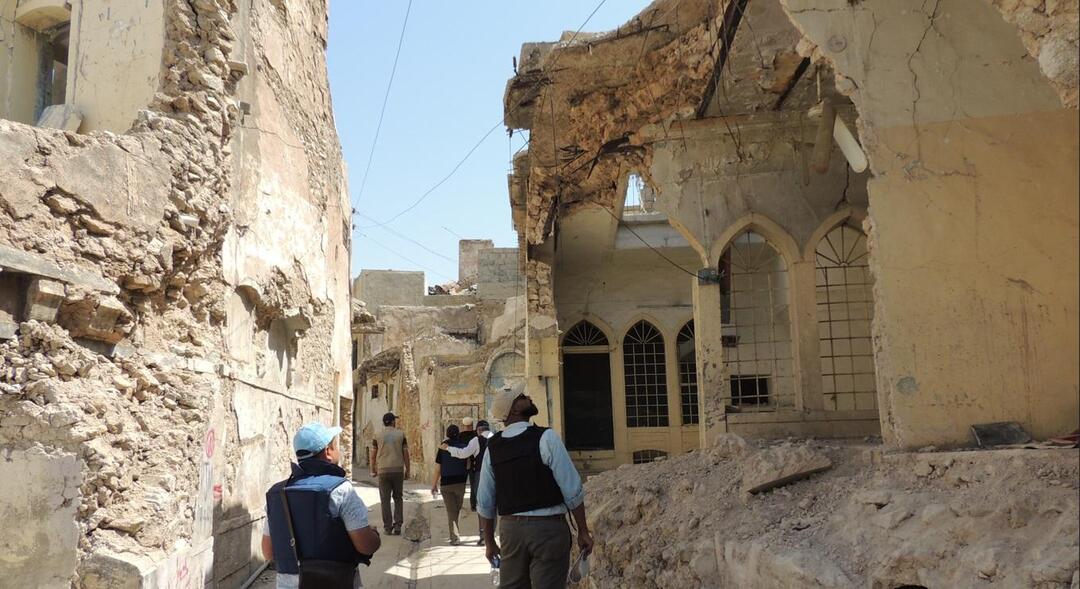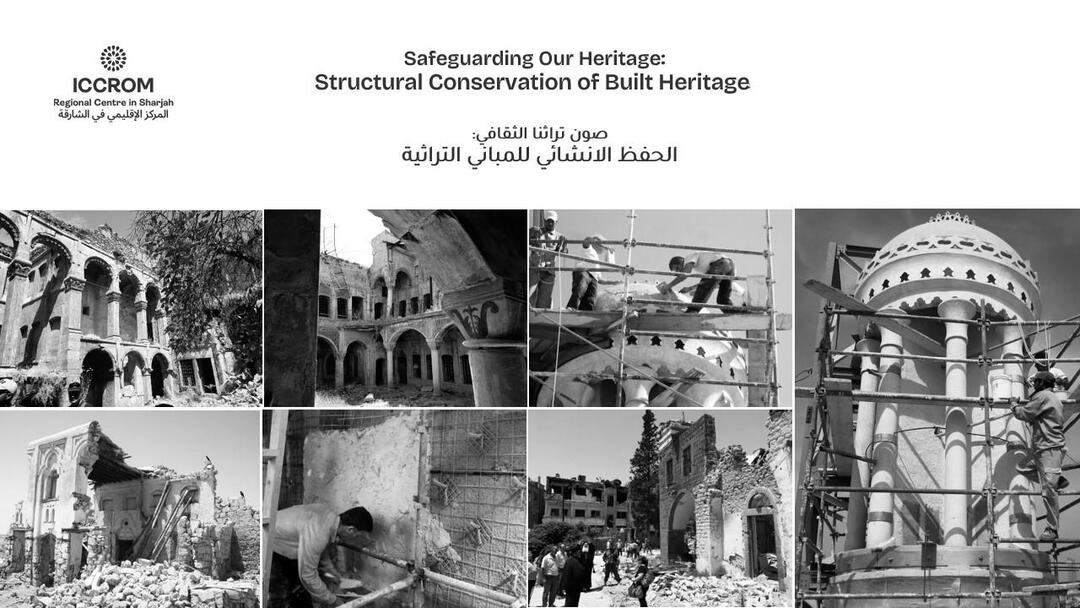-
With the participation of 275 trainees from 24 countries
-
ICCROM Regional Centre in Sharjah organizes a training course on Structural Conservation of Built Heritage

Sharjah-United Arab Emirates, 19 October 2024 – The online training course, entitled "Structural Conservation of Built Heritage," organized by the ICCROM Regional Centre in Sharjah (International Centre for the Study of the Preservation and Restoration of Cultural Property), kicked off today. The course, which will run from 19 October to 10 November 2024, has attracted 275 participants from 24 countries in the Arab region and worldwide.
The training course aims to educate participants about the importance of structural conservation in the integrated conservation process and provide a comprehensive framework for understanding, evaluating, and addressing the complexities of structural conservation for heritage buildings following crises. It encourages participants to showcase their projects on ICCROM's platforms, promoting wider dissemination of knowledge and best practices in structural conservation. The course also contributes to strengthening the capacities of heritage institutions in the Member States by qualifying youth teams and addressing expertise gaps through practical training and project implementation.
The course provides participants with the knowledge and skills needed to manage conservation projects effectively and raises critical questions related to structural conservation. Some of the questions covered in the course include: What are the fundamental principles for preserving heritage buildings? What are the modern sciences and technologies utilized in structural conservation studies? How is a structural conservation project planned, and where does the structural conservation process fit into preserving a heritage property? Are traditional materials suitable for addressing structural failure?
The course also prompts discussions on other relevant questions, such as: how essential is preserving the historical structural system? Is it adequate to maintain the shape and structure of buildings while altering their structural system? What measures are in place to control Portland cement and other common materials in historical buildings? What is the connection between structural and architectural conservation? Should historical buildings be reinforced against earthquakes? What are the standards and codes for the structural conservation of historic buildings? These are just a few of the many questions that will be explored by practitioners and professionals in the field of cultural heritage conservation.

Architect Anwar Sabik, manager of the course and Programme Officer (Training and Field Projects) at the ICCROM Regional Centre in Sharjah, stated, "This course is part of the training and capacity building program at the ICCROM Regional Centre in Sharjah. The program includes academic research qualification through a Master's Program in Cultural Heritage Conservation Management implemented in partnership with the University of Sharjah and practical skills training through seasonal training courses." He also mentioned that ”the course sees significant Arab and regional participation, with trainees attending from various institutions and projects dedicated to preserving cultural heritage from 24 countries in the Arab region and worldwide.”
Dr. Marwan Al-Heib and Engineer Ayman Hazralla delivered the training course. Dr. Al-Heib has over 41 years of experience in civil engineering and risk assessment. He is a project manager, teacher, and researcher at the University of Lorraine in France and an expert in the restoration and preservation of historic sites and buildings using advanced technologies and numerical modeling for historic buildings in many countries, including Egypt, Syria, Lebanon, Libya, Iraq, France, Oman, Saudia Arabia, etc.
Engineer Hazrallah is a professional architect and engineer with extensive expertise in structural and seismic design and the consolidation and restoration of historical, artistic, and monumental buildings. He graduated in Architecture with a specialization in Structural Engineering from the University of Rome "La Sapienza" and earned a Master's in Architectural Design from the same institution.
The training course comes when the region faces complex challenges due to damage caused to humans and the environment by natural and human causes. Many tangible cultural heritage components have been damaged, which poses a real threat to their structure and survival. Furthermore, a significant loss of knowledge regarding heritage preservation methods, techniques, and technologies has occurred due to the deterioration of heritage institutions, the decline of state infrastructure in many areas, brain drain, cessation of training, and discontinuation of expertise transmission. The expertise and skills required for structural consolidation of damaged heritage have become highly needed. This training course is part of ICCROM's efforts to enhance heritage protection, disaster management, and first aid in times of crisis.
About the ICCROM Regional Centre in Sharjah
The ICCROM Regional Centre in Sharjah is a cultural hub generously supported by His Highness Sheikh Dr Sultan bin Muhammad Al Qasimi, the Ruler of Sharjah and member of the Supreme Council of the United Arab Emirates. The office is a powerhouse of cultural heritage knowledge, specially created for widespread adoption in Arabic-speaking countries. Launched in 2012, ICCROM-Sharjah is dedicated to protecting cultural heritage in the Arab region and broadening access, appreciation, and understanding of its rich history.
You May Also Like
Popular Posts
Caricature
BENEFIT Sponsors BuildHer...
- April 23, 2025
BENEFIT, the Kingdom’s innovator and leading company in Fintech and electronic financial transactions service, has sponsored the BuildHer CityHack 2025 Hackathon, a two-day event spearheaded by the College of Engineering and Technology at the Royal University for Women (RUW).
Aimed at secondary school students, the event brought together a distinguished group of academic professionals and technology experts to mentor and inspire young participants.
More than 100 high school students from across the Kingdom of Bahrain took part in the hackathon, which featured an intensive programme of training workshops and hands-on sessions. These activities were tailored to enhance participants’ critical thinking, collaborative problem-solving, and team-building capabilities, while also encouraging the development of practical and sustainable solutions to contemporary challenges using modern technological tools.
BENEFIT’s Chief Executive Mr. Abdulwahed AlJanahi, commented: “Our support for this educational hackathon reflects our long-term strategic vision to nurture the talents of emerging national youth and empower the next generation of accomplished female leaders in technology. By fostering creativity and innovation, we aim to contribute meaningfully to Bahrain’s comprehensive development goals and align with the aspirations outlined in the Kingdom’s Vision 2030—an ambition in which BENEFIT plays a central role.”
Professor Riyadh Yousif Hamzah, President of the Royal University for Women, commented: “This initiative reflects our commitment to advancing women in STEM fields. We're cultivating a generation of creative, solution-driven female leaders who will drive national development. Our partnership with BENEFIT exemplifies the powerful synergy between academia and private sector in supporting educational innovation.”
Hanan Abdulla Hasan, Senior Manager, PR & Communication at BENEFIT, said: “We are honoured to collaborate with RUW in supporting this remarkable technology-focused event. It highlights our commitment to social responsibility, and our ongoing efforts to enhance the digital and innovation capabilities of young Bahraini women and foster their ability to harness technological tools in the service of a smarter, more sustainable future.”
For his part, Dr. Humam ElAgha, Acting Dean of the College of Engineering and Technology at the University, said: “BuildHer CityHack 2025 embodies our hands-on approach to education. By tackling real-world problems through creative thinking and sustainable solutions, we're preparing women to thrive in the knowledge economy – a cornerstone of the University's vision.”
opinion
Report
ads
Newsletter
Subscribe to our mailing list to get the new updates!






















